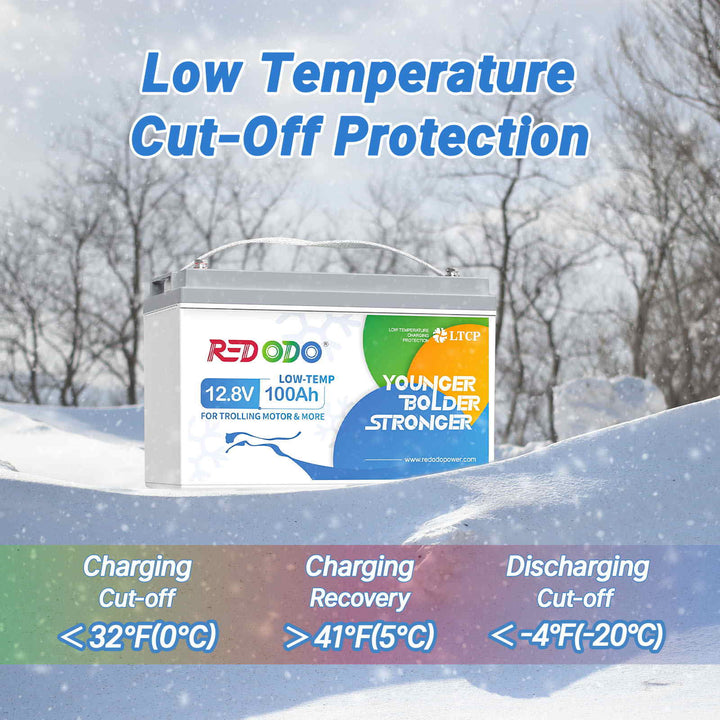What's the Best Battery for Cold Weather?
If you live in cold climates or passionate about winter adventures, choosing the best battery for cold weather is essential for reliable performance, whether you’re powering an RV, boat, trolling motor, or off-grid system.
In this article, we’ll break down different battery types for cold weather, including lead-acid, AGM, and lithium, explain why lithium performs best in freezing conditions. We’ll also recommend the best lithium batteries for cold weather, to make sure your power supply thrives in winter.
Takeaways
For cold-weather applications, lithium batteries clearly outperform traditional lead-acid, AGM, and Gel options. Choose the cold weather lithium batteries with low-temp protection or heating function, which ability to maintain capacity, accept charging safely in low temperatures, and deliver consistent power makes them the best battery for cold weather.
Table of Content
Why Cold Weather Affects Battery?
Extreme temperatures can affect batteries. Cold weather slows the chemical reactions inside a battery, increasing internal resistance and reducing capacity. As a result, the batteries become harder to start engines or shorter to keep electronics running.
Key challenges include:
- Reduced capacity: Chemical reactions inside the battery slow down in low temperatures, which causes the internal resistance increased and decreases the amount of energy it can deliver.
- Decreased voltage output: Cold weather can reduce the battery’s voltage, making it harder to start engines or power electronics efficiently.
- Charging limits: Most lithium batteries should not be charged below 32°F (0°C), as doing so can permanently damage the cells.
- Freezing risk: Lead-acid and AGM batteries can freeze when their charge level is low, potentially cracking the cells and causing permanent damage.
- Potential safety hazards: Extreme cold can sometimes trigger internal shorts or leaks in poorly designed batteries, creating safety risks.
Which Type of Battery is Best for Cold Weather?
There are three types of batteries the most commonly used: Flooded lead-acid, AGM, Gel, and lithium.
Cold temperatures affect all batteries, but lead-acid types are particularly vulnerable. Their capacity may drop by 50%-60% when temperatures fall below 0°C (32°F).
Lithium batteries have a lower energy loss in cold weather, because they warm up during work, reducing resistance inside the cells. That means they can still provide around 95–98% of their usable capacity when temperatures drop below freezing.
However, normal lithium batteries can’t safely accept a charge under freezing conditions, which can damage the cells. That’s why winter-ready models with self-heating or low-temperature protection are crucial.
Best Lithium Batteries for Cold Weather at Redodo
Redodo specializes in LiFePO4 lithium batteries built for reliability in demanding conditions. Here are the top-pick lithium batteries for cold weather:
1. Redodo 12V 100Ah Self-Heating Lithium Battery
This self-heating lithium battery is a game-changer for cold weather. Equipped with 100W dual heating pads, it automatically activates heating when the temperature drops below 32°F (0°C), the heating stops and charging resumes normally above 41°F (5°C). This revolutionary technology ensures effortless charging in cold climates.
The self-heating battery also features low-temperature protection for double safety guarantee. It is ideal for those who living in off-grid cold regions and need year-round reliability without complicated heating pads.
Key features:
- EV-grade LiFePO4 cells
- 4000+ deep cycles at 100% DOD
- Lightweight design at only 23.32 lbs
- Compact Group 31 size
- Self-heating in -4°F to 41°F (-20°C to 5°C)
- Low Temp Cut Off Protection
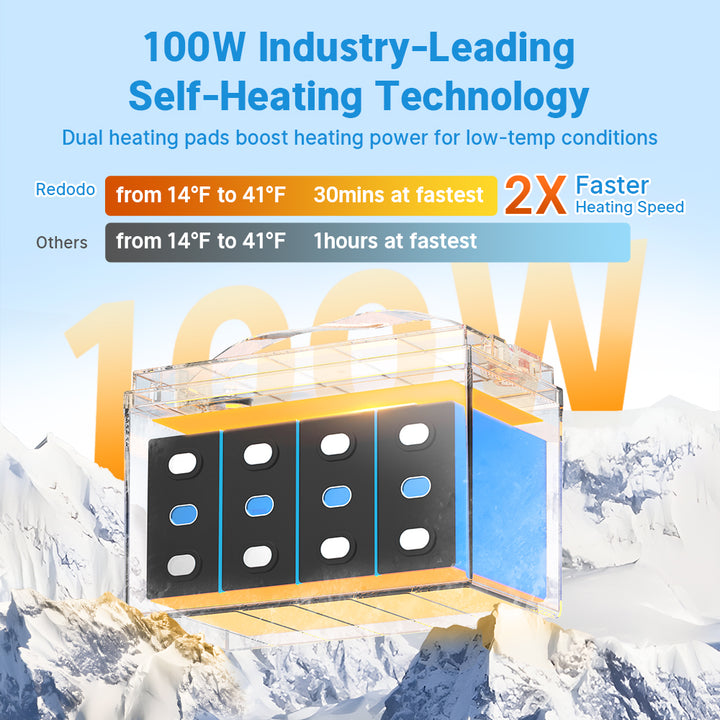
2. Redodo 12V 100Ah Lithium Trolling Motor Battery
For anglers who fish in icy waters need steady power for trolling motors and electronics, this battery is one of the best cold-weather lithium marine battery. It features low-temperature charging protection, cutting off charging when the temperature drops freezing temperature.
Delivering 1280Wh of energy and high discharge current, it powers trolling motors up to 70 lbs thrust and other essential onboard electronics. Even in cold-weather fishing trips, you can trust this ice fishing battery to deliver steady, reliable energy in cold lakes and rivers.
With dependable cold-weather performance, you can relax and enjoy your time on the water, knowing your battery has you covered every step of the way.
Key features:
- 1280Wh of energy and 1280W of output power
- Compact Group 31 size
- Lightweight design at 22.15 lbs
- Low temperature protection
- Enhanced moisture-proof, and salt-spray anti-levels for marine
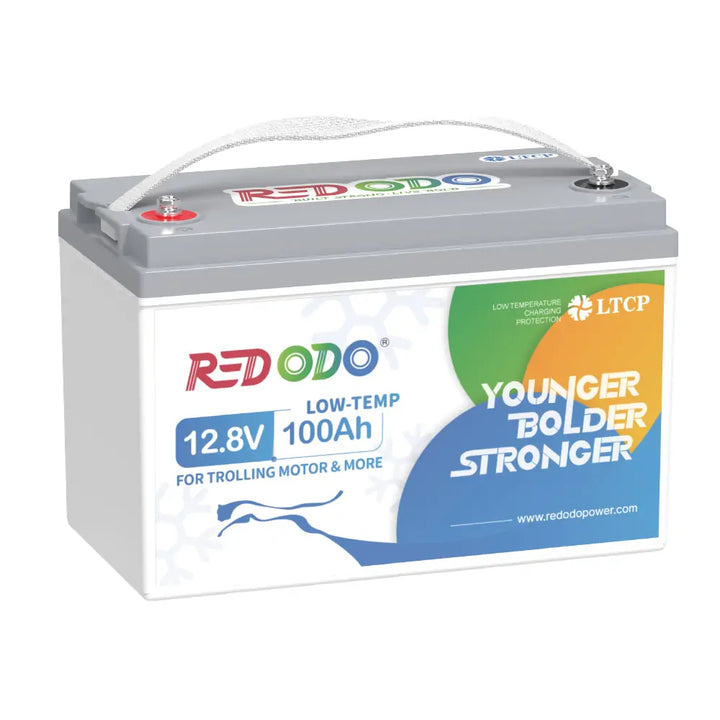
3. Redodo 12V 165Ah Group 31 Bluetooth Lithium Battery
Are you looking for best RV battery for cold weather? The Redodo 12V 165Ah Group 31 RV Bluetooth Battery is designed for RV owners, anglers and solar users who need more power while keeping the convenient Group 31 size.
With upgraded BMS, you can enjoy the peace brought by low-temperature protection and the convenience of Bluetooth monitoring.
At 2112Wh, it provides ample energy for mutiple devices, while still fitting in standard Group 31 compartments. Lightweight, durable, and reliable, this battery makes cold-weather fishing trips more enjoyable and worry-free.
Key features:
- High 2112Wh energy storage
- Compact Group 31 size
- Weighs only 33lbs
- Bluetooth smart monitoring
- Upgraded BMS for 20+ protections including extreme climates
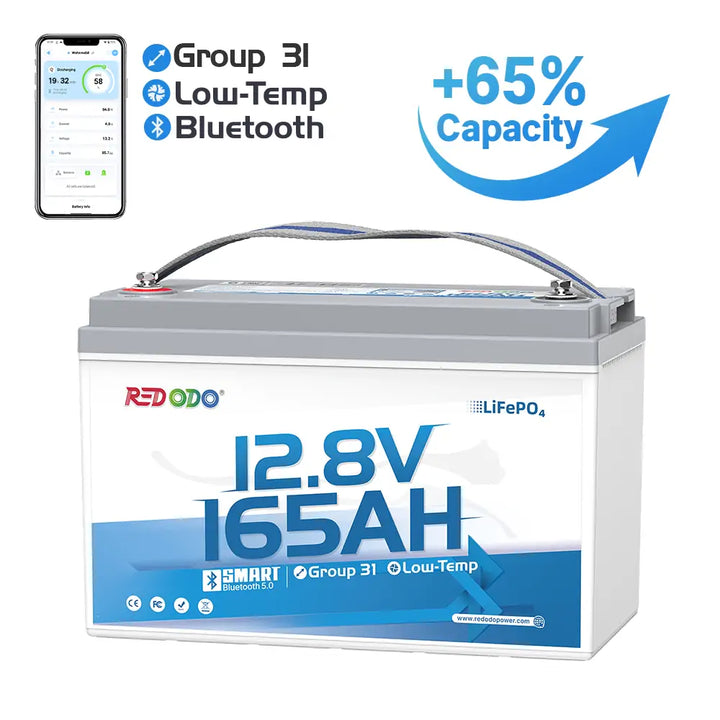
4. Redodo 12V 200Ah Lithium Low Temp Battery
The Redodo 12V 200Ah Low-Temp Lithium Battery is ideal for RV camping and extended adventures where consistent power is a must.
Equipped with advanced LiFePO4 cells and low-temperature protection, this battery is perfect for winter trips or high-altitude camping. With 2560Wh of energy, it can power RV appliances, heaters, lights, and other electronics for longer periods, giving you the freedom to explore without compromise.
Its robust BMS safeguards against overcharge, over-discharge, overcurrent, and extreme temperatures, while the lightweight design simplifies installation and transport. For cold-weather RV camping, this battery provides the confidence and energy you need to enjoy every trip.
Key features:
- 2560Wh high capacity
- Weighs only 42 lbs, much lighter than lead-acid
- Simple installing and easy handling
- Top-grade LiFePO4 cells for long lifespan
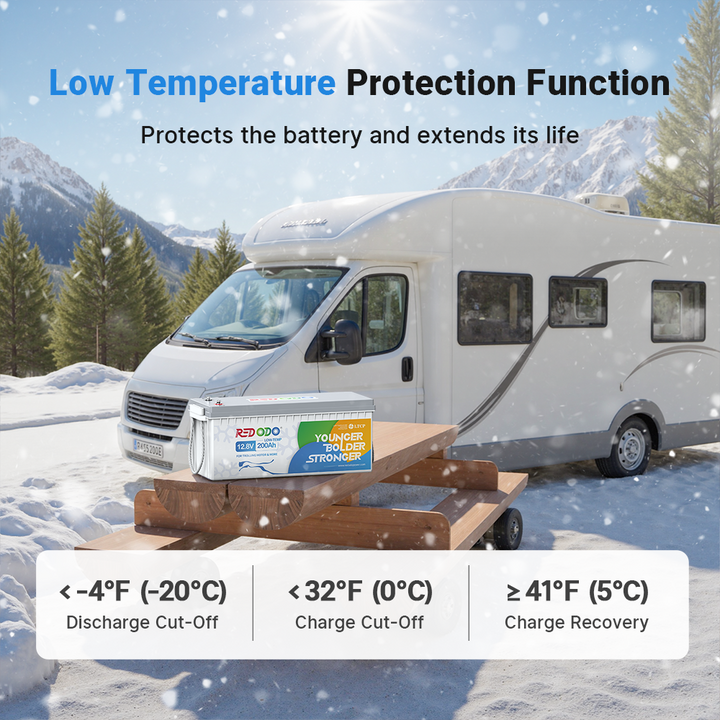
5. Redodo 12V 280Ah Lithium Low Temp Battery
When you need maximum energy in extreme conditions, the 12V 280Ah Lithium Battery is the ultimate solution. Designed for demanding off-grid systems or large RVs, it pairs massive capacity with low temperature cut-off safeguards.
With 3584Wh of energy storage, this battery can power high-demand appliances, inverters, and off-grid systems for extended periods. Durable and cold weather-resistant, it’s perfect for cabins, RVs, or remote solar setups.
Whether you’re traveling, working remotely, or living off-grid in winter climates, this battery delivers reliable, safe, cold-weather energy when you need it most.
Key features:
- 3584Wh energy storage
- Robust 200A BMS for 2560W of output power
- Weighs just 59.2 lbs
- Upgraded protections against dust, water, and salt spray
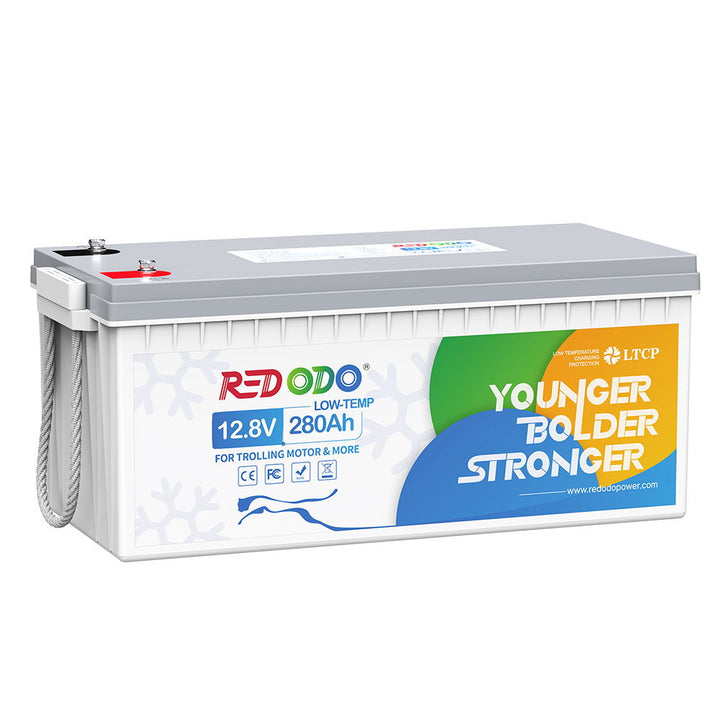
Tips for Using Lithium Batteries in Cold Weather
Even with advanced protection, good battery care helps maximize lifespan. Follow these tips to maximize performance and life:
Avoid Full Discharges
Discharging lithium batteries completely in cold temperatures can put unnecessary stress on the cells. Try to maintain at least 20–30% charge as a buffer during extreme winter conditions. This practice extends cycle life and ensures you always have backup power when you need it most.
Avoid Storing Batteries in Cold Conditions
Always keep your batteries in a temperature-controlled environment above 32°F (0°C) when not in use. For long-term storage, the ideal temperatures are 59°F to 95°F (15°C to 35°C). in cold conditions is unavoidable, consider using insulated battery boxes or self-heating solutions to protect the battery and maintain its health.
Keep Connections Clean and Tight
Cold weather can cause terminals to contract and increase resistance, which may reduce efficiency or cause voltage drops. Regularly inspect and clean battery terminals, and ensure all connections are secure.
Monitor Temperature and State of Charge
Use a battery monitor or Bluetooth-enabled lithium battery to keep track of temperature, voltage, and remaining capacity. Monitoring helps prevent over-discharge in cold conditions and allows you to plan power usage more efficiently. It also gives peace of mind, ensuring your battery stays within safe operating limits.
Conclusion
Finding the best battery for cold weather is about more than just capacity. It’s about safety, longevity, and reliable performance when temperatures plunge. Lithium batteries with self-heating or low-temperature protection outperform traditional lead-acid options, giving you peace of mind on every adventure.
Redodo’s low-temperature lithium battery lineup ensures your RV, boat, trolling motor, or off-grid setup stays powered all winter long. Power your winter journeys with Redodo lithium batteries!
Read More:
Do Lithium Batteries Freeze in Cold Weather?
How to Store Your RV Battery in Winter & Cold Weather?

Redodo

Redodo
Join Redodo
Related Post

How to Upgrade Travel Trailer Battery to Lithium?

How to Store a Deep Cycle Marine Battery for Winter?

What Size Solar Panel Do I Need to Charge A 12V Battery?

Light Up Your Christmas with Redodo: LiFePO4 Batteries Holiday Deals

